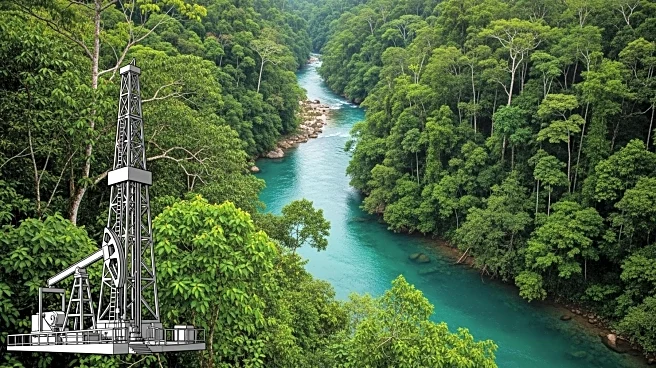What's Happening?
Brazil's state-controlled energy company, Petrobras, has been granted permission to drill an exploratory oil well in the Foz do Amazonas basin, near the Amazon River. This marks the end of a lengthy dispute
with environmental regulators. The drilling operation is set to begin immediately and is expected to last five months. The approval comes as Brazil is set to host the UN climate conference, COP30, highlighting the nation's focus on both economic growth and environmental stewardship. Despite protests from environmental activists, Petrobras, along with Exxon Mobil and Chevron, has obtained exploration rights in the area.
Why It's Important?
The approval for oil exploration near the Amazon River is crucial for Brazil's energy strategy, as it aims to enhance its energy sovereignty while addressing environmental concerns. The Foz do Amazonas basin is considered a promising offshore oil region, vital for Brazil's future energy production. However, environmentalists warn of the risks posed by potential oil spills to the Amazon's ecosystem and indigenous communities. The decision reflects Brazil's challenge in balancing economic development with environmental protection, especially as it hosts COP30, a significant climate conference.
What's Next?
Petrobras will commence drilling with an emphasis on emergency response strategies to minimize environmental risks. The Brazilian Institute of Environment and Renewable Natural Resources has highlighted improvements in the project's emergency response framework. As drilling proceeds, further environmental assessments and simulations will be conducted to address wildlife response strategies. The success of this exploration could shape Brazil's long-term energy policy and its position in global climate discussions.
Beyond the Headlines
The exploration in the Foz do Amazonas basin could have lasting effects on Brazil's oil industry, which faces challenges due to unsuccessful exploration efforts in other regions. The project's success may determine Brazil's future as an oil producer and its potential transition to becoming a net importer. The decision also raises ethical considerations about prioritizing economic interests over environmental protection, particularly in ecologically sensitive areas.











